T&T Clark Studies in Theological Systems (5 vols.)
Digital Logos Edition
Overview
This collection of T&T Clark guides and companions offers in-depth yet accessible introductions to several major theological traditions for seminary and university students, pastors, and interested laypeople. The T&T Clark Companion to Reformation Theology is a major reference work on all aspects of theology in the Reformation period. Stephen R. Holmes’ Baptist Theology presents the history and development of Baptist theology, as well as a presentation of its unifying characteristics. In Methodist Theology, Kenneth Wilson provides a comprehensive overview of the rich history and theology of the Methodist tradition. Wolfgang Vondey presents a helpful introduction to one of the youngest, yet fastest-growing Christian traditions in Pentecostalism: A Guide for the Perplexed. And in Process Theology: A Guide for the Perplexed, Bruce G. Epperly provides a clear and accessible introduction to one of the more challenging theological systems to understand and interact with.

- Simplified explanation of technical concepts
- Syntheses of diverse theological perspectives from experts in the field
- Guides to major Christian traditions, all in one place
- Title: T&T Clark Studies in Theological Systems
- Publisher: T&T Clark
- Volumes: 5
- Pages: 1,288
Individual Titles
- T&T Clark Companion to Reformation Theology edited by David M. Whitford
- Baptist Theology by Stephen R. Holmes
- Methodist Theology by Kenneth Wilson
- Pentecostalism: A Guide for the Perplexed by Wolfgang Vondey
- Process Theology: A Guide for the Perplexed by Bruce G. Epperly
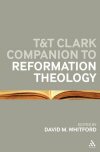
T&T Clark Companion to Reformation Theology
- Editor: David M. Whitford
- Series: Bloomsbury Companions
- Publisher: T&T Clark
- Publication Date: 2012
- Pages: 520
This volume is a major reference work on all aspects of theology in the reformation period. Editor David M. Whitford assembles an able group of scholars to present a detailed outline of the Reformed tradition. The contributors guide the reader through the historical background and theological development of this rich heritage. Major topics of theology within the Reformed tradition are discussed, including human nature and the fall, election and justification, the sacraments, eschatology and the Antichrist, and much more. The essays provide a helpful guide to the major aspects of the historic Reformed faith and offer new insights that will generate further dialogue and refinement of the tradition.
David Whitford has succeeded in bringing those specialists together that have given in this book a full oversight of the theology of the Reformation in all of its variety. Latest results of research, a fine combination of theology and history, and an accessible style make this book into one of the leading handbooks on our way to 2017 and beyond.
—Herman Selderhuis, professor of church history and church polity, Theological University Apledoorn, Netherlands
Whitford opens this overture to Reformation theology with a wise essay on how neophytes might take their first steps in the discipline. In what follows, eighteen seasoned pros weigh in with substantial contributions on the classical loci, salient themes, and neuralgic issues. A fine starting point for graduate students and seminarians.
—Denis R. Janz, provost distinguished professor of the history of Christianity, Loyola University, New Orleans
David Whitford is professor of the history of Christianity at United Theological Seminary in Ohio. He is the author of Luther: A Guide for the Perplexed, Tyranny and Resistance: The Lutheran Tradition and the Magdeburg Confession, Reformation and Early Modern Europe: A Guide to Research, as well as numerous articles on Reformation Europe. He is the associate editor of The Sixteenth Century Journal.
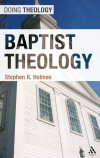
This book considers the distinctive ideas and expressions of Christian faith found in the historic Baptist churches. An outline of the history of the Baptist movement is offered, from its British beginnings in Amsterdam in 1609, through its varied developments in Britain, Europe, and North America, to its worldwide presence and diversity today, and its relationship to many other churches with apparently-similar practices (e.g. Pentecostal and “new” churches). Holmes draws the various threads together, noting the real diversities in the history of Baptist theology, but suggesting that in a vision of the present and urgent Lordship of Christ experienced in the local congregation, there is a thread that links most of these distinctives.
In exploring the Baptist tradition, Stephen Holmes offers an astonishing range of material packed into a relatively small space. He clarifies the difficult balance between individuality and life in community that Baptists have tried to maintain, and with an exceptional ease he integrates history with theology, offering many insightful theological judgments as he tells the story. In a masterful way, he sets the development of a particular group within the wider movements of church, society, and Christian thought, in a tour de force that should be read by all students of the Christian Church.
—Paul S. Fiddes, professor of Systematic theology, Regent’s Park College, Oxford
Do Baptists have a theology? The answer, as this book clearly shows, is ‘Yes.’ But what sort of theology is it? Is it a version of Protestant evangelicalism, democratic individualism, or radical sectarianism? Holmes offers an account of Baptist theology as an activity that attends closely to the convictions and practices of congregations. This explains why expressions of Baptist theology often vary significantly. Yet in the particular attention to local gatherings, Holmes displays that Baptists still share the theological consensus of the wider church on such basic doctrines as the Trinity, the person and work of Christ, and creation. But as Holmes also makes plain, this emphasis on the gathered community finds distinctive manifestation in congregational church government, respect for the liberty of conscience, and participation in God’s mission to the world. It is a clear and concise summary of Baptist theology that deserves to be widely used.
—Curtis W. Freeman, research professor of theology, Duke University Divinity School
Stephen Holmes is lecturer in theology at The University of St Andrews. He has published several volumes in the field of Christian theology and has previously collaborated with Colin Gunton in The Practice of Theology.
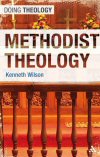
This book is written to capture the imagination and engage the reader in conversation by expressing the essence of the Methodist tradition. Methodism is presented not as a doctrinaire society, yet one that is clear about what it believes. Methodists confidently develop their theology through conversation with the world of secular knowledge, with other Christian traditions and other religious faiths, drawing on contemporary biblical scholarship, and with careful attention to the Christian tradition. In terms of mission, Methodism is serious about worship—public and personal—since it wants to celebrate the reality of God’s presence with his people—all his people. This is because Methodist theology is grounded in the grace of God that it proclaims to be free for all and is essentially Christological and Trinitarian. Thus, Methodism is keen to draw others into its fellowship and does not have missionary societies but rather sees itself as a society organized for mission.
This is a book in which the author defies the gravity of age, and combines a rare mix of well earned wisdom with inspiring youthful enthusiasm. Dr. Wilson moves effortlessly through the roots, branches, and flowering of Methodist Theology, with a passionate belief in reasonable Christianity, and in the part that Methodism can play in that today. An up-to-date book with an old fashioned commitment to the disciplines of study and thoughtfulness.
—Mark Wakelin, secretary for internal relationships, The Connexional Team, UK
Methodist Theology by Kenneth Wilson is a book that will enlighten, inform, and inspire all who pick it up. It comes from one of the most gifted, creative, and ecumenically-minded Methodist scholars of his generation . . . This work sets Methodism and its distinctive theological and ecclesiological traditions in their wider historical, intellectual, and social context and makes the story of how Methodism came into being come alive in a highly accessible manner. Wilson paints rich parallels across the centuries and explains the more complex theological emphases dear to the heart of the Methodist movement with a clarity rarely found in foundational textbooks . . . A tour de force of historical and systematic theology alike, this work should be required reading for anyone interested in contemporary doctrinal and ecclesiological currents of thought.
—Gerard Mannion, professor of theology and religious studies, University of San Diego
. . . members of other churches will be fascinated by an account of Methodist theology that looks at both doctrines and the teaching of major Methodist figures.
—Church of England Newspaper
Kenneth Wilson has done an excellent job articulating the theological thinking of those ‘reflective practitioners’ who call themselves Methodist.
—Church Times
Kenneth Wilson was educated at Cambridge and Bristol Universities and is a Methodist Minister. After chaplaincies to London University and Kingswood School, he held the Rowbotham Chair in Philosophical Theology and Ethics at Wesley College in Bristol and taught at Bristol University from 1973 to 1980. From 1980 to 1996 he served as principal of Westminster College, Oxford and from 1996 to 2001 was the director of research at the Queens Foundation in Birmingham. He currently serves as visiting research fellow at Canterbury Christ Church University and Chichester University.
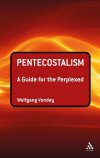
Pentecostalism is the fastest growing religious movement of our time. The unexpected birth of the modern Pentecostal movement at the doorsteps of the twentieth century is as perplexing as its continuing existence and unprecedented expansion worldwide. Once marginalized from public discourse, Pentecostals have now entered into mainstream culture, religion, politics, academia, and social action. However, the unprecedented growth of Pentecostalism in all its diversity has led to characterizations ripe with platitudes, stereotypes, and misrepresentations.
This volume sheds light on the most persistent contrasts characterizing the Pentecostal movement: the tension between local manifestations and global Pentecostalism, the inconsistency between spiritual discernment and charismatic excess, the gap between rampant denominationalism and the pursuit of Christian unity, the disparity between poverty among many Pentecostals and the popularity of the prosperity gospel, the division between Oneness Pentecostals and their Trinitarian counterparts, and the worldview of Pentecostals beyond the confines of a religious movement. Those tensions form the essence of global Pentecostalism and represent the emergence of a global Christian world.
Vondey is a sure guide to the global phenomenon of Pentecostalism and its primary and scholarly resources, expertly sifting out the complexities of the many tongues of the movement and charting helpful frameworks to understanding and engaging with it. Beginner students and informed observers alike will benefit from this perspicacious study.
—Amos Yong, J. Rodman Williams Professor of Theology, Regent University
Wolfgang Vondey is associate professor of systematic theology and director of the Center for Renewal Studies at Regent University in Virginia Beach.
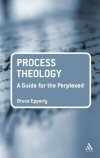
This is an accessible introductory guide to process theology designed for seminary and university classes as well as lay study. In addition to addressing the major tenants of process theology as they relate to traditional theological issues, Epperly addresses cutting-edge issues in theology and ethics such as pluralism and postmodernism, matters of life and death, science (technology and genetics), and emerging forms of Christianity. Epperly assists readers to overcome the obstacles created by the technical language often employed by process theologians. By concentrating specifically on what it is that makes the subject difficult to grasp, Process Theology: A Guide for the Perplexed is a clear, concise, and accessible introduction to thinkers, writers, and subjects within the theological movement.
Process theology comes in many forms. Some technical philosophical forms confuse more than enlighten. Bruce Epperly offers his own form of process theology in accessible narrative and confessional prose. The anecdotes, case studies, and stories bring alive process perspectives on crucial issues of our time. This book should further establish and expand process theology’s standing as a persuasive alternative for making sense of God and the many dimensions and questions of our existence.
—Thomas Jay Oord, elder, Nampa First Church of the Nazarene
Unbelievable. Bruce Epperly really succeeds at communicating process theology in its full breadth and depth, in ways that will satisfy newcomers and advanced students alike. Yet he does it almost wholly without the use of technical terms! Epperly’s writing flows beautifully. . . . Perhaps the best in-depth introduction to process theology available for non-specialists.
—Philip Clayton, Ingraham Professor of Theology, Claremont School of Theology
Given that process theology has earned a reputation for being one of the least accessible theological movements, Bruce Epperly does a good job in helping to clarify the main arguments and translating the vocabulary into something akin to everyday usage.
—The Church Times
There is much to commend with this book . . . for a cogent, lucid, well-illustrated, grounded, passionate, comprehensive introduction to one of the most lively and influential schools of theological thought of the last 50 years, Epperly’s book does its job very well.
—Regents Review
Bruce Epperly is professor of practical theology and director of continuing education at Lancaster Theological Seminary in Pennsylvania.